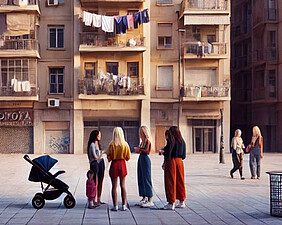The course focuses on human geographical approaches to space with an emphasis on issues of gender and gendered organization, understanding and management of space, drawing also from the related fields of sociology of space and urban studies. The course examines how space is involved in the construction and shaping of gendered and other social identities, the forms of spatial appropriation by different social groups, as well as the ways in which space influences—and determines—gendered and other social relations.
More specifically, the course examines the ways in which different social groups are distributed across space and appropriate it, drawing on the academic discourse on sociospatial segregation with a focus on its gendered dimensions. Furthermore, it explores the evolution of thought on gender and its intersections with conceptualizations of space as both a social product and producer. The course engages with theories of public and private space and spheres, the notion of “separate spheres”, as well as spaces of production and reproduction, highlighting the significance of in-between places that emerge beyond binary divisions. Drawing from feminist and postcolonial approaches, special emphasis is placed on the formation of gendered identities through an intersectional lens, examining the interconnections among multiple axes of identity and power such as gender, sexuality, ethnicity, social class, language, and religion. Additionally, the course emphasizes the understanding of the social construction of space and place through the study of gendered everyday experiences and an open-ended approach to the concept of scale.
The course is structured in two parts. The first part focuses primarily on theoretical approaches, while the second addresses methodologies for studying the intersections between space and gender. In this context, emphasis is placed on qualitative research methods in human geography, particularly on methodological tools such as qualitative interviews and fieldwork. The course also includes collective methodological workshops and on-site visits in the city.

